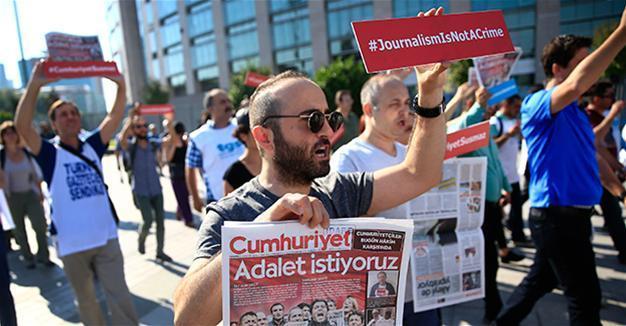Daily Cumhuriyet warnings against Gülenists went ignored: Columnist Çetinkaya
ISTANBUL

AP photo
Daily Cumhuriyet was among the first to report about the dangers posed by the Fethullah Gülen network in the past, but those reports went unnoticed, daily Cumhuriyet columnist Hikmet Çetinkaya said during his defense on July 27, as the trial into the journalists and executives from the daily over terror charges continued on the fourth day.Being tried without arrest in the case, Çetinkaya said in his testimony that he had been a journalist for the past 51 years and one of his most important reports was about Fethullah Gülen, the U.S.-based preacher of the network. But he said the daily’s reports about the network had been ignored.
“Around 170 lawsuits were filed against me and I was acquitted on most of them while I received pecuniary fine from some of them. Turkey did not know about Fethullah Gülen when I reported on its organization within the police, the judiciary and education. When we wrote about its organization in the U.S. under the name of ‘Altın Nesil’ [Golden Generation] no one saw what was happening. I threw this imam’s mask off who had been receiving salary from the state… All political powers constantly said how innocent the organization was and how unfair I was about it. They filed lawsuits against me over my reports on ‘Hocaefendi’ [Gülen],” Çetinkaya said.
He also added that he denied the indictment in the name of journalism and his reporting, saying that he could never give up the principles of a secular, democratic state and the rule of law.
In addition, Aydın Engin, another journalist tried without arrest in the case, said in his testimony that such an indictment against the daily was shameful in the name of law and was also painful to him in name of the country.
He stated that nine of his columns which had been mentioned in the indictment as an element of crime did not require an additional response as they were pretty clear. Engin said he was thinking about the possibility that the prosecutor either did not read the content of the columns or understand them.
Regarding a phone call record with Harun Tokak, the so-called Israel imam of the Gülen network, mentioned in the indictment, Engin said it was the nature of journalism to talk with people regardless of their organization.
“You have to talk to understand what an organization that infiltrated the depths of the state means. You should separate the profession of journalism from being a terrorist. I reported stories to understand the goal of terror groups,” Engin said.
Being the third journalist tried, Orhan Erinç said journalists had falsely been expected to act as a judge or prosecutor, adding that it was a news report for a journalist whether it is about corruption, a fight or a brawl.
“I understand that judges are reading what we, as journalists, write to inform the public as espionage,” Erinç said.
He added that it was not the daily’s editorial policy that had changed but the agenda of the country and the news flow that was determined accordingly, refuting claims of a shift in the daily’s policy.
















